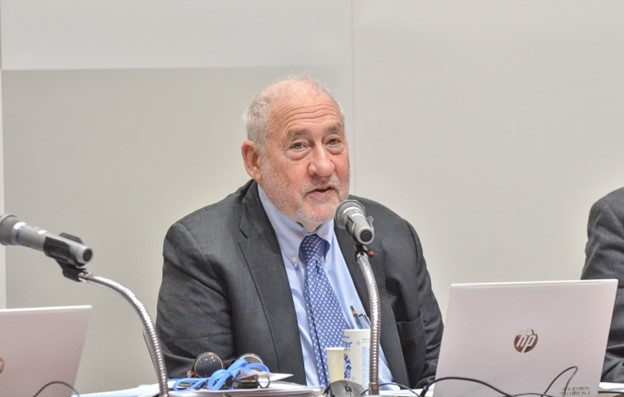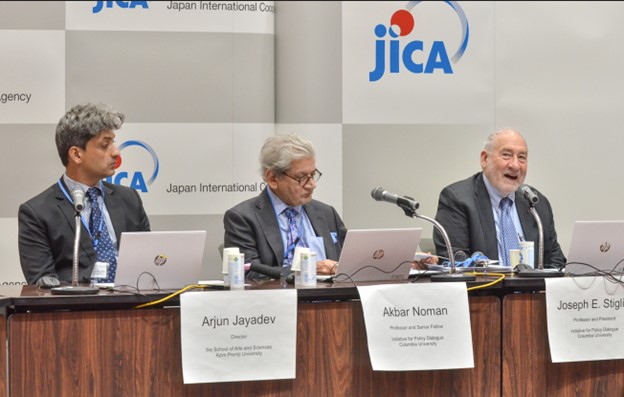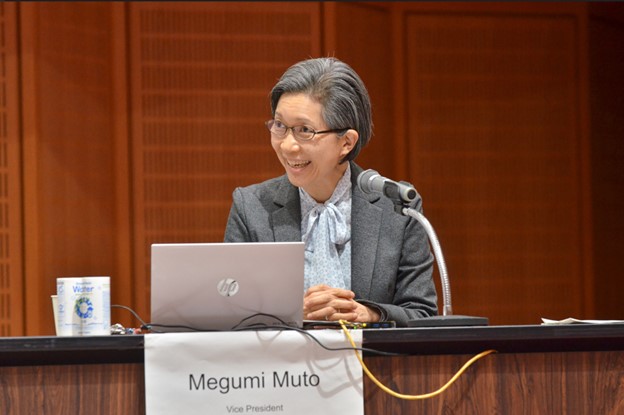Knowledge Forum Featuring Professor Joseph E. Stiglitz “The Future of Employment in a Changing Global Economy”
2024.04.26
Featuring presentations from Joseph Stiglitz, Nobel Laureate in Economics and professor at Columbia University, Akbar Noman, professor at Columbia University, and Arjun Jayadev, director of the School of Arts and Sciences at Azim Premji University, this Knowledge Forum was hosted by the JICA Ogata Sadako Research Institute for Peace and Development (JICA Ogata Research Institute) on March 11, 2024. Participants in the forum discussed the evolving nature of employment and the specific challenges faced by developing countries—particularly in Africa—in creating jobs. The forum provided a meaningful opportunity to enhance our collective understanding of employment challenges in the current global context and to discuss necessary actions to bring about a prosperous, dignified future for all.
JICA President Tanaka Akihiko delivered his opening remarks, saying that developing countries face the task of generating sufficient jobs for their growing youth populations, while developed countries with aging demographics must address labor shortages to meet Sustainable Development Goals. In recent years, the economic crisis triggered by COVID-19 led to a decline in labor demand, hitting vulnerable groups hard. Challenges include the impact of digital transformation on jobs and the threat AI poses to employment. Tanaka shared JICA’s activities in partner countries that focus on productive employment and decent work, emphasizing human security and quality growth for all.

JICA President Tanaka Akihiko gives his opening remarks.
Stiglitz summarized the challenges facing developing countries, particularly in Africa. Export-led growth faces challenges in today's world as the global economy shifts away from manufacturing, affecting developing countries' ability to compete. The service sector, though promising, often generates lower-quality jobs and may not provide the desired development impact. Agriculture, while crucial, struggles due to factors like climate change, competition from developed countries, and resource depletion, hindering long-term growth prospects. These obstacles underscore the need for innovative solutions to navigate the evolving landscape of economic development for countries today, Stiglitz said.

Professor Joseph Stiglitz, Nobel Laureate in Economics talks about the challenges facing developing countries, particularly in Africa.
Stiglitz argued that the current global context presents additional challenges for developing countries. Historically, economic rules have favored powerful countries and have lacked accountability. Recent actions, like the US Inflation Reduction Act supporting green industries, challenge international norms. This imbalance leaves developing countries and some European countries struggling to respond effectively. Uncertainty persists as global institutions adjust to new norms, hindering developing countries' adaptability. Global polarization offers opportunities and challenges. Increased competition can redirect resources to developing countries but aligning with global rules also forces tough decisions that may have an impact on progress. The core issue is the mismatch between perceived resource scarcity for green development and actual capital surplus, highlighting the need for effective policy solutions.
He also pointed to additional factors contributing to the challenges of development in Africa, including immense demographic pressures resulting from rapid population growth and significant ecological obstacles such as climate change and land scarcity. Additionally, global policy regimes hinder African countries from breaking free from historical trade patterns, perpetuating raw material exportation over value-added activities.
Stiglitz contended that to achieve successful development in African countries, it is imperative to move beyond the export-led growth model and embrace new multi-pronged strategies focusing on technological advancement and industrial policies. This shift is crucial due to the diminishing competitive edge of unskilled labor and natural resources. The path to modernization demands creativity, a robust international support system, including financial aid and conducive global regulations, and a strong emphasis on green structural transformation. Collaboration among nations, with Japan playing a significant leadership role, is essential for navigating challenges like climate change and geopolitical shifts. Reciprocal support for developing countries will be vital for advancing shared agendas and fostering global cooperation, Stiglitz said.

From left: Arjun Jayadev, director of the School of Arts and Sciences, Azim Premji University, Professors Akbar Noman and Joseph Stiglitz of Columbia University
Following the presentation, Harada Tetsuya, executive senior research fellow at the JICA Ogata Research Institute chaired the discussion, posing a question as to how we should view the challenges of Africa. Noman cited the success of countries like Ethiopia and Rwanda, which have experienced structured transformation and generated decent employment opportunities, as a reason for optimism regarding development in Africa. Jayadev noted that we all treat Africa as if it's one country but there’s a huge amount of variation across African countries, with varying degrees of pessimism and optimism depending on the country. The Green Investment Initiative, which JICA Vice President Muto Megumi discussed in her brief presentation, also contributes to this optimism. The potential for green job opportunities in Africa is considered significant, and there are examples of African successes that are relevant to the policy prescriptions needed for the transformation of African society and the generation of decent jobs.

JICA Vice President Muto Megumi discussed the Green Investment Initiative
However, there are challenges that need to be addressed, including the magnitude of population growth in Africa, with 40% of the world's population expected to live in Africa by 2100, according to Mine Yoichi, executive director of the JICA Ogata Research Institute. The adaptation of foreign ideas and technologies to different contexts is also crucial, as imposing a development model from the outside has proven to be unsuccessful. Balancing the pace of change is also important, as releasing too much labor from the agricultural sector can impose burdens of transition on the urban sector, he said.

Mine Yoichi, executive director of the JICA Ogata Research Institute, stressed the need for the adaptation of foreign ideas and technologies to different contexts for successful development.
Following the discussion, attendees of the forum raised questions about preparing for the potential impact of a would-be Trump administration on climate change and African development and addressing political economy challenges in countries like Madagascar. In response, Stiglitz cited the need for international cooperation to uphold rules related to climate change in cases where the US policy was out-of-step with international goals and underscored the importance of strong governance given the inextricable link between politics and economic development. A link to the video recording is available below.

事業事前評価表(地球規模課題対応国際科学技術協力(SATREPS)).国際協力機構 地球環境部 . 防災第一チーム. 1.案件名.国 名: フィリピン共和国.

事業事前評価表(地球規模課題対応国際科学技術協力(SATREPS)).国際協力機構 地球環境部 . 防災第一チーム. 1.案件名.国 名: フィリピン共和国.

事業事前評価表(地球規模課題対応国際科学技術協力(SATREPS)).国際協力機構 地球環境部 . 防災第一チーム. 1.案件名.国 名: フィリピン共和国.

事業事前評価表(地球規模課題対応国際科学技術協力(SATREPS)).国際協力機構 地球環境部 . 防災第一チーム. 1.案件名.国 名: フィリピン共和国.

事業事前評価表(地球規模課題対応国際科学技術協力(SATREPS)).国際協力機構 地球環境部 . 防災第一チーム. 1.案件名.国 名: フィリピン共和国.
scroll